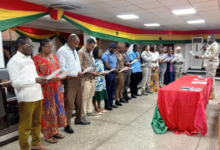
The Russian Embassy in Ghana has handed over 22 Kamaz trucks and five trailers to the World Food Programme (WFP) office in the country.

The vehicles, which are part of the 97 Kamaz trucks and 30 trailers donated by the Russian government to the United Nations WFP, was to enhance transport capacity and boost the operational performance of WFP’s regional fleet hubs.
Ghana’s consignment is expected to be dispatched for emergency work in the Central African Republic (CAR) and the Democratic Republic of Congo (DRC).
Presenting the vehicles yesterday in Accra, Dmitry Suslov, Russian Ambassador to Ghana, said the donation was on the basis of agreement on strategic partnership between the Russian government and WFP.
In addition to the vehicles, he said four mobile training clusters, refuellers and spare parts would be stationed at the WFP four regional hubs in Afghanistan, United Arab Emirates (UAE), Uganda and Ghana.
Since 2011, Mr Suslov noted that Russia has donated about 260 trucks to the WFP which materially improved the situation in the UN truck fleet.
He reiterated Russia’s commitment to continue to be an active partner of WFP, which was a critical world humanitarian agency of the United Nations (UN).
WFP Representative and Country Director, RukiaYacoub, said that as part of the agreement, Kamaz would provide a three-year training programme to WFP fleet and workshop managers, mechanic and drivers.
The trucks, she said, has enabled efficient operation of the UN Humanitarian Response Depot (UNHRD) in Ghana where humanitarian items were dispatched to emergency hotspots when required.
By nature of its work, she stated that WFP operates an average of 5,000 commercially contracted trucks in a given day in addition to its 800 heavy duty trucks in difficult operations.
Since being incorporated into WFP’s global fleet, the Kamaz trucks donated by Russia has covered more than 6.5 million kilometres and transported 350,000 metric tonnes of food to remote areas, she added.
The trucks, Ms Yacoub said, has been a cheaper alternative to the use of aviation services in transporting food which has helped in reducing the cost of WFP’s operations.
BY CLAUDE NYARKO ADAMS and MALISA TETTEH







